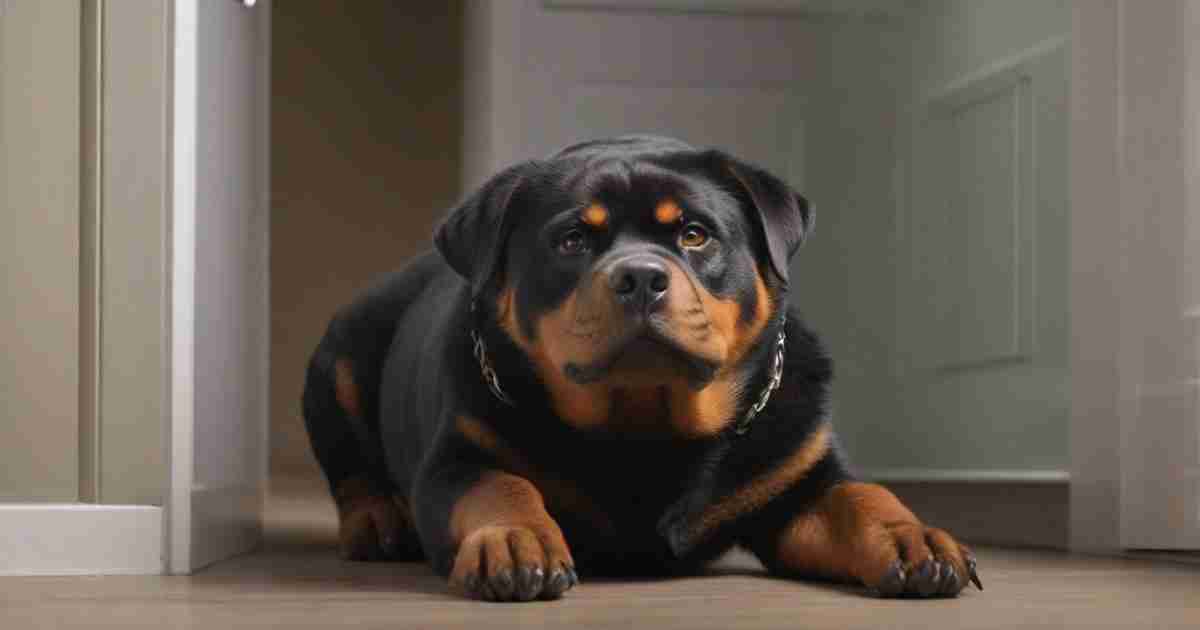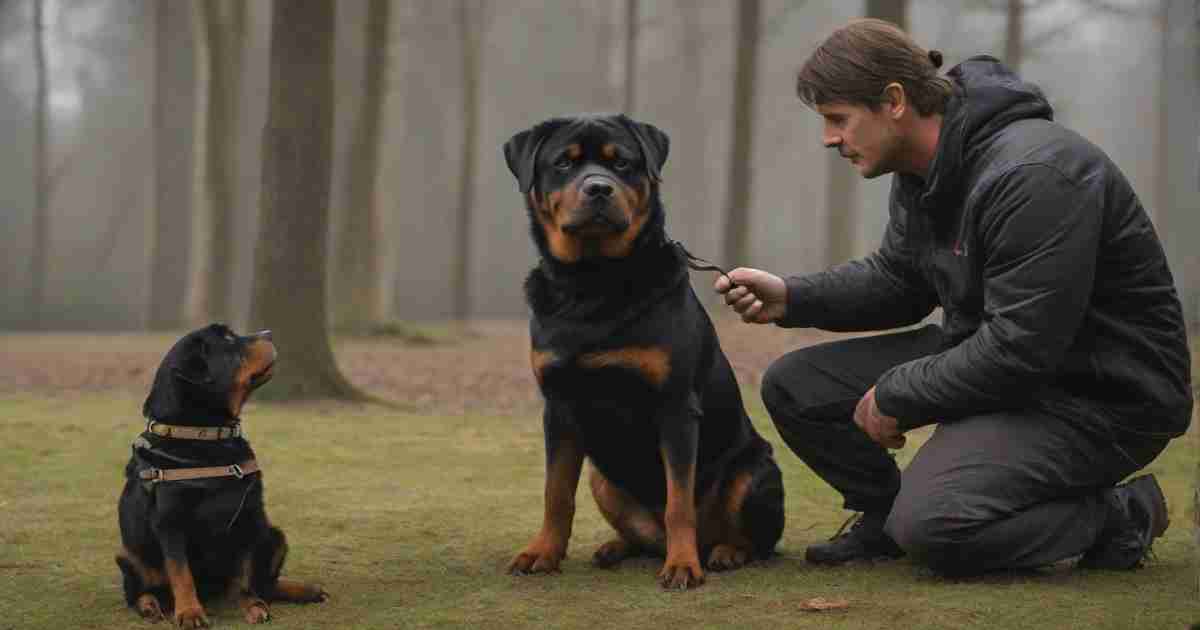Rottweilers are known as loyal companions who form extremely devoted bonds with their owners. They naturally drive to protect and stay close to their “pack leader.”
However, this desire to be dedicated can become an unhealthy obsession if boundaries are not set properly. What are the differences between a Rottweiler who adores you versus one becoming dangerously fixated?
Obsession involves anxiety when separated, aggressiveness toward others, and generally the inability to function without the object of fixation — in this case, the owner.
On the other hand, a loving and loyal Rottweiler enjoys being with their family, feels alone for periods, and does not disturb household activity and routines.
This article will cover the signs that your Rottweiler has moved beyond healthy devotion into detrimental obsession, the causes for this extreme attachment, the risks it poses, and tips to overcome it.
Does your Rott pack member shadow your every step? Do they pine and misbehave the minute you step out?
Keep reading to discover whether your bond has gone overboard into obsession or remains within the expected range of unwavering Rottie dedication.
What Does It Mean for a Rottweiler to be Obsessed?
An obsessed Rottweiler behaves much differently than one who is merely devoted. While loyalty and affection come innately to the breed, an unhealthy fixation exhibits more extreme behaviors.
Signs of an obsessed Rottweiler include:
- Severe separation anxiety anytime apart from the owner
- Aggressiveness toward strangers, guests, or other dogs who approach the owner
- Destructive behaviors like chewing, digging, or self-harm when left alone
- Pacing, whining, and howling nonstop in the owner’s absence
- Following the owner from room to room refuses to settle independently
- Blocking pathways or restricting the owner’s movement
- Ignoring basic training commands because too focused on stalking the owner’s every move
These go beyond the normal dedicated shadowing and desire to keep flock members safe, which is common in the breed. Rottweiler obsession means the dog becomes so dependent on your presence that it cannot function healthily when you are away.
Reasons Why Rottweilers Become So Attached
There are some key reasons why Rottweilers as a breed are prone to developing intensely devoted bonds with their owners that can turn into unhealthy obsessions.
Factors that contribute to Rottweiler’s obsession include:
- Strong pack drive: As descendants of ancient Roman drover dogs, Rottweilers have a natural pack mentality and need for leadership. They form intensely loyal attachments to their “alpha” owner. Without proper boundaries, this can lead to following you relentlessly and becoming distraught when separated.
- Bred-to-be working guard dogs: Historically used to herd livestock and guard property, protectiveness is embedded in their DNA. This vigilance can transform into anxiety and aggression if not handled properly.
- The desire for affection/attention: Rottweilers crave quality time, touching, praise, and play with their owner. Without sufficient outlets, they resort to obsessive nudging, staring, and clinging behaviors to get it.
- Poor socialization: Failing to socialize Rottweiler puppies properly can significantly contribute to separation anxieties and fear-based aggression issues as adults. They need extensive positive exposure to other people, animals, places, and circumstances to prevent obsession.
The key is channelling Rottweiler’s innate loyalty into healthy devotion instead of a detrimental obsession. Setting rules, boundaries, and expectations from the start prevents over-reliance on the owner. Getting enough activity, socialization, and mental stimulation also keeps attachments in check.
15 Signs Your Rottweiler Is Truly Obsessed
Has your Rottweiler’s devotion crossed the line into an unhealthy obsession? Here are 15 key signs of an obsessed Rottweiler:
-
Shadowing Your Every Move
An obsessed Rottweiler feels compelled to follow you from room to room, never letting you out of sight.
They lay outside the bathroom door, awaiting your exit. It goes beyond the normal Velcro tendencies of the loyal breed.
-
Distress When You Leave
Though Rottweilers shouldn’t be left alone for long periods, an obsessed dog will still whine, pace, and panic, even during a quick run to the store. They may scratch, chew, and otherwise destroy things in their anxiety.
-
Acting Possessive with Toys or Food
While resource guarding is common, an obsessed Rottweiler takes it to the extreme, growling if you approach their stuff. They see their possessions as precious “gifts” for their beloved owner.
-
Being Overprotective
It’s in the Rottweiler’s genes to use their intimidating voice and presence to ward off potential threats to their clan.
But obsessive dogs become overly defensive, barking aggressively at any noise or guest. They may also block or herd your movements.
-
Excessive Licking and Nuzzling
Lots of sloppy kisses are a sign of Rottie’s adoration. But the obsessive dog takes it overboard, relentlessly licking you without pause. Nuzzling and pawing you for attention also exceeds healthy attachment.
-
Ignoring Commands and Training
A devoted Rottweiler will still listen despite distractions. But obsessed pups are too fixated on monitoring the owner to pay attention, resisting training and commands to stay glued by your side.
-
Leaning Heavily Against Your Legs
Rottweilers love to learn, but an obsessed dog puts so much weight against your legs that it’s like carrying a 60 lb ankle bracelet everywhere! They are trying to maintain constant physical contact.
-
Laser-Focus Eye Contact
The loyal breed is known for gazing adoringly at owners. But obsessed pups take it further with an intense, unwavering stare, trying to read and preempt your every step or need. Their sole focus is you to the exclusion of all else.
-
Aggression Toward Others Approaching You
While properly introduced guests are normally fine, the obsessed Rottweiler may show aggression toward anyone encroaching on “their” special bond with the owner. Their jealousy and guarding instincts heighten with fixation.
-
Destructiveness When Left Alone
Chewing, digging, self-harming, and soiling the home are distress behaviors when a Rottweiler with separation anxiety is left solo.
But the obsessed dog destroys this panic in the owner’s absence.
-
Self-Harming Behaviors
Excessive licking, biting, and chewing at their fur or paws till they bleed or limp is a tragic sign of a Rottweiler stressed out without their beloved owner constantly present.
-
Bringing Toys to Bed or Guarding Behaviors
The obsessed Rottweiler may exhibit guarding behaviors like insistently depositing squeaky toys on your bed to entice play or “protect” you at night. This controlling tendency can progress over time.
-
Howling and whining when the Owner is Out of Sight
Rottweilers generally only howl for important reasons. But the obsessed pup may vocalize nonstop even if you go take the trash out, exaggerating separation. Excited whining when you return also exceeds normal greeting behaviors.
-
Excessive Sniffing of Belongings
An obsessed dog feels compelled to sniffingly track the comings and goings of their owner via clothing, shoes, and other objects when apart. They are gathering intel and soothing anxiety, verifying your scent.
-
Lack of Interest in Walks or Play Without You
With a healthy bond, Rottweilers still enjoy activities like fetch, tug, or park trips with other pack members.
But an obsessed dog fixates solely on the owner, refusing walks or play unless directly interacting with the person.
Is Extreme Devotion Ever Dangerous?
Rottweilers were historically valued for their unwavering loyalty. But left uncontrolled, that same dedication can curdle into a detrimental obsession that poses risks, including:
Potential Risks of an Obsessed Rottweiler
- Aggression issues: Obsessive fixation plus protective instincts can prompt biting or aggression toward strangers, guests, or other pets, infringing on their exclusive bond with the owner.
- Self-harm behaviors: Stressed by separation anxiety, the obsessed dog may compulsively lick, bite, or chew themselves, even tearing out fur or causing injury.
- Property destruction: Doors, walls, furniture, and more can fall victim to an anxious Rottweiler’s chewing, scratching, digging, or soiling when left alone. Costly damage often results.
- Deteriorating health: The cortisol and adrenaline overload of constant stress impacts immune health over time. Obsessive pups may refuse food or drop weight when the owner is away.
- Relationship strain: The demanding clinginess and neediness of an obsessed Rottweiler can place draining restrictions on normal household life and activities for the owner. Tension often follows.
In rare cases, euthanasia has even occurred when destructive separation anxiety or aggression could not be resolved. Allowing devotion to spiral into obsession has real risks.
Is Extreme Devotion Ever Dangerous?
Rottweilers were historically valued for their unwavering loyalty. But left uncontrolled, that same dedication can curdle into detrimental Rottweiler obsession that poses risks, including:
Potential Risks of Rottweiler Obsession
- Aggression issues: Obsessive fixation plus protective instincts can prompt biting or aggression toward strangers, guests, or other pets, infringing on their exclusive bond with the owner.
- Self-harm behaviors: Stressed by separation anxiety, the obsessed dog may compulsively lick, bite, or chew themselves, even tearing out fur or causing injury.
- Property destruction: Doors, walls, furniture, and more can fall victim to an anxious Rottweiler’s chewing, scratching, digging, or soiling when left alone. Costly damage often results.
- Deteriorating health: The cortisol and adrenaline overload of constant stress impacts immune health over time. Obsessed Rottweilers also may refuse food or drop weight when the owner is away.
What to Do If Your Rottweiler is Becoming Obsessed
If you’ve noticed the emergence of unhealthy attachment signs in your Rottweiler, from separation anxiety to aggression, don’t despair.
There are training and lifestyle adjustments that can help dial down the obsession before it causes real harm.
Solutions for an overly obsessed Rottweiler include:
- Committing to thorough, patient obedience training to establish leadership, commands, and good behavior habits. Their minds need proper stimulation.
- Ensuring your Rott gets adequate daily exercise like longer leashed walks, hikes, or fetch games. A tired dog is less prone to neurotic fixations.
- Building confidence and independence through socialization with new environments, people, and other calm dogs. It prevents over-reliance on one person.
- Providing interesting chew toys when you step out and rewarding quiet, relaxed behavior, not anxious chaos. Set them up for success.
- Using calming aids like ThunderShirts or pheromone diffusers to take the edge off during periods of separation. Ask your vet for obsessive anxiety-fighting prescription medications if needed.
- Working with professional trainers or behaviorists for customized treatment plans targeting destructive fixations. Get expert guidance tailoring the approach to your Rottweiler’s needs.
Rottweiler’s obsession can be curbed with diligence and the right mix of leadership, nurturing, and professional support. The key is addressing it proactively before it spirals out of control.
Conclusion
Finding the Balance of Loyalty and Independence
At their best, Rottweilers represent peak unwavering yet still stable companionship.
With attentive leadership and proper training reinforcement, their natural dedication wonderfully manifests as faithful assistance, pleasant respect, and protective affection.
Prevent obsession through upfront socialization, enough affection, and outlets like play and commands holding their focus.
Channel that loyalty into a harmonious relationship, furthering everyone’s happiness and safety.
FAQs
Q: Why do Rottweilers get so attached to owners?
A: Strong pack drive, guarding instincts, and desire for affection/attention fuel their intense bond.
Q: At what age does a Rottweiler become protective?
A: Protective traits start emerging around 2 years old but need proper handling to prevent obsession.
Q: How do I know if my Rottweiler’s separation anxiety is abnormal?
A: If they injure themselves, destroy property, or refuse to eat when alone, it requires intervention.
Q: Can a dog behaviorist help obsessed Rottweilers?
A: Yes, certified specialists create customized training plans targeting extreme separation anxiety, aggression, or fixation.
Q: Will getting a second dog help an obsessed Rottweiler?
A: Only if properly introduced. Caution is needed so fixation doesn’t shift or cause dog-vs-dog conflicts.










1 thought on “Rottweiler Obsession: 15 Signs of Unwavering Devotion”